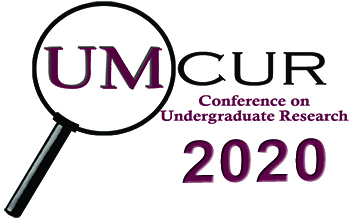Project Type
Presentation
Faculty Mentor’s Full Name
Dr. Laurie Slovarp
Faculty Mentor’s Department
School of Speech, Language, Hearing, and Occupational Sciences
Abstract / Artist's Statement
Approximately 20% of patients with chronic cough, or cough that lasts greater than 8 weeks, do not respond to medical intervention and are said to have refractory chronic cough (RCC). The suggested cause for RCC is a hypersensitive urge-to-cough triggered by an increased expression of sensory receptors in the throat. The evidence-based treatment for RCC is behavioral cough suppression therapy (BCST), however, patients with RCC who cannot suppress their cough are unable to benefit from BCST and remain without a solution.
The goal of our current study is to test a novel treatment for RCC, pairing gradually increasing doses of aerosolized capsaicin, a known cough stimulant found in chili peppers, with BCST for the patients with RCC who do not benefit from BCST alone. The purpose is to present the participants with a cough stimulant dose strong enough to elicit an urge-to-cough (UTC) but weak enough to allow for cough suppression.
The current study is a randomized, placebo-controlled clinical trial with patients with RCC. Pretesting outcome measures include cough challenge testing recording the baseline dose of capsaicin that elicits five coughs (C5), urge-to-cough testing, cough-related quality-of-life via the Leicester Cough Questionnaire, self-reported cough triggers, and 24-hour cough frequency measured with the Leicester Cough Monitor. Participants attend six therapy sessions where they are exposed to aerosolized capsaicin paired with cough suppression strategies. The treatment group receives progressive doses above their C5 threshold, while actively suppressing cough. The placebo group receives subthreshold doses paired with relaxed throat breathing. The outcome measures are repeated at one-week and three-week post-testing. Our first cohort treatment group data is encouraging, suggesting the feasibility of the combined approach as a treatment for RCC. The treatment group exhibited both decreased cough hypersensitivity scores and better quality-of-life scores. The placebo group did not show similar improvements.
Category
Social Sciences
Chili Pepper Molecule as Potential Treatment for Cough Hypersensitivity Syndrome
Approximately 20% of patients with chronic cough, or cough that lasts greater than 8 weeks, do not respond to medical intervention and are said to have refractory chronic cough (RCC). The suggested cause for RCC is a hypersensitive urge-to-cough triggered by an increased expression of sensory receptors in the throat. The evidence-based treatment for RCC is behavioral cough suppression therapy (BCST), however, patients with RCC who cannot suppress their cough are unable to benefit from BCST and remain without a solution.
The goal of our current study is to test a novel treatment for RCC, pairing gradually increasing doses of aerosolized capsaicin, a known cough stimulant found in chili peppers, with BCST for the patients with RCC who do not benefit from BCST alone. The purpose is to present the participants with a cough stimulant dose strong enough to elicit an urge-to-cough (UTC) but weak enough to allow for cough suppression.
The current study is a randomized, placebo-controlled clinical trial with patients with RCC. Pretesting outcome measures include cough challenge testing recording the baseline dose of capsaicin that elicits five coughs (C5), urge-to-cough testing, cough-related quality-of-life via the Leicester Cough Questionnaire, self-reported cough triggers, and 24-hour cough frequency measured with the Leicester Cough Monitor. Participants attend six therapy sessions where they are exposed to aerosolized capsaicin paired with cough suppression strategies. The treatment group receives progressive doses above their C5 threshold, while actively suppressing cough. The placebo group receives subthreshold doses paired with relaxed throat breathing. The outcome measures are repeated at one-week and three-week post-testing. Our first cohort treatment group data is encouraging, suggesting the feasibility of the combined approach as a treatment for RCC. The treatment group exhibited both decreased cough hypersensitivity scores and better quality-of-life scores. The placebo group did not show similar improvements.
